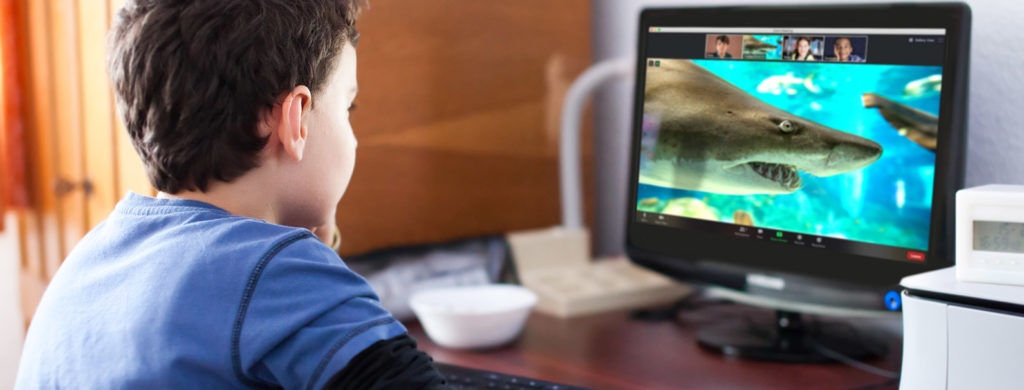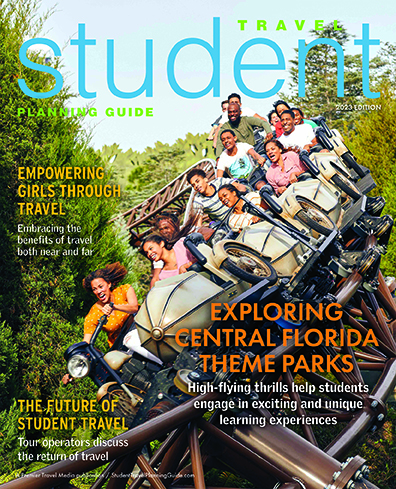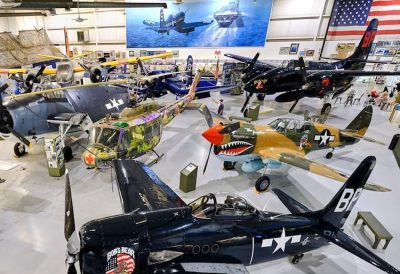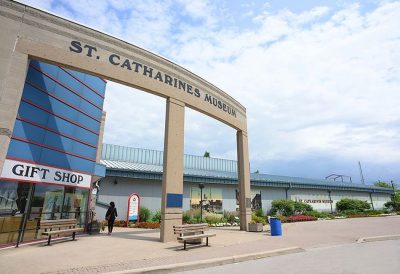Bring planetariums, prairies and the Jurassic Era to your virtual classroom with assistance from the Southwestern science museums.
Distance learning has created many change for students, educators and parents, and curriculums and teaching styles have seen change and transitions, including field trips. Virtual programs and field trips provided by museums, aquariums, zoos and more have found ways to support STEM education and provide a fun and fresh source of discovery in virtual classrooms.
Texas
Space Center Houston created a free app to explore self-guided virtual tours and videos containing stories of space exploration in the past and what’s to come in the future. The app was created to expand the exposure of STEM learning whether users can be in attendance at the museum or discover the features virtually.
The Texas State Aquarium is helping to support students and educators with their free Aquavision distant learning programs. Resources include live streams of exhibits, videos with interactive activities, printable subject learning sheets and “Ask an Expert” live streams. Students and educators have the chance to explore Texas State Aquarium’s website to meet and read about the aquatic animals currently at the aquarium and learn about all the exhibits the aquarium offers.
The Houston Museum of Natural Science offers multiple virtual field trip experiences that can go the extra mile in discovering educational topics. They offer a virtual dinosaur adventure, a wildlife safari, an inside look into the world of energy and a journey through ancient Egypt using live and pre-recorded video programs, planetarium show rentals, printable activities using museum exhibits and the option for students to order items from the museum store that are on-topic from their field trip experience.
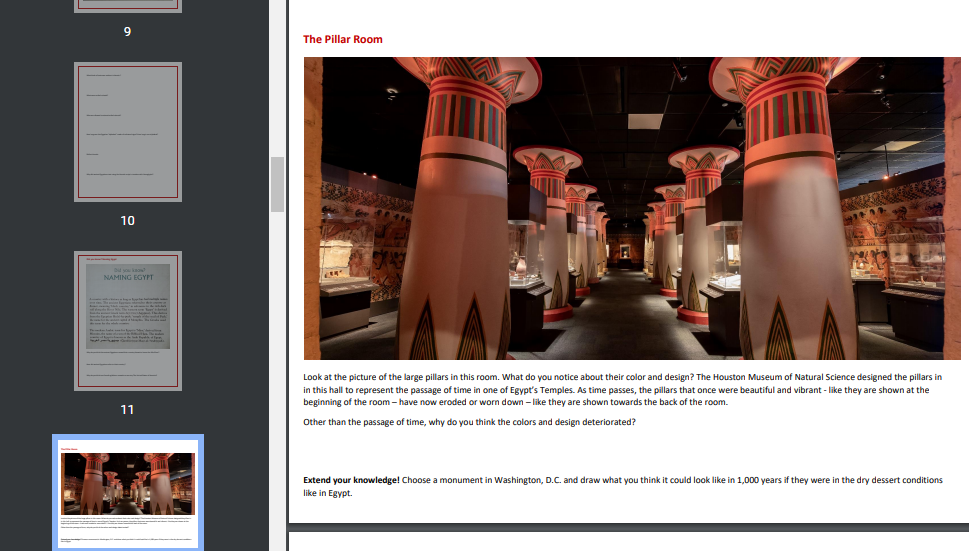
Houston Museum of Natural Science
Oklahoma
The Tulsa Zoo provides multiple educational programs for schools and groups to experience the zoo remotely. Their four Zoo 2 U programs and Meet n’ Greet option all promote learning and visual experience for a classroom setting and at-home learning. Students have the ability to talk with a zoo expert, take a virtual, expert-led tour of the zoo and/or watch a prerecorded video by a zoo educator featuring animals and biofacts. Tulsa Zoo’s personalized Meet n’ Greets allow groups to view and learn about a specific animal of your choosing. All programs offer different rates, time allocations and activities meeting the Oklahoma Academic Standards.
The Oklahoma Aquarium offers two free virtual field trip programs for grades K-12 that fit the needs of different learning environments. Their virtual tours field trip offers the experience to walk through some of their most popular exhibits: the sea turtle exhibit, Polynesian Reef, the world’s largest collection of bull sharks and their newest exhibit (“The Secret World of the Octopus”) all while over Zoom with an aquarium educator leading the way. Their second field trip option is a pre-recorded video with activities and the opportunity to follow-up with a question and answer Zoom session with an aquarium educator. Age-appropriate video options are available on their website when registering for a field trip. Both field trips offer different time allocations, printable activities following the Oklahoma Academic Science Standards and age-appropriate materials and experiences.
The Nature Conservancy has created a website called OK360 to provide virtual tours of five of Oklahoma’s nature preserves so that students and educators can virtually experience the natural world around them. The website encourages virtual field trips to allow students to view and explore Tallgrass Prairie Preserve, J.T. Nickel Preserve, Four Canyon Preserve, Oka’ Yanahli Preserve and Pontotoc Ridge Preserve. The Nature Conservancy suggests scavenger hunts on OK360 to help the learning process and exploration of this resource along with incorporating the program into curriculum based assignments and using it to develop sensory skills with the audio and video features on the website.
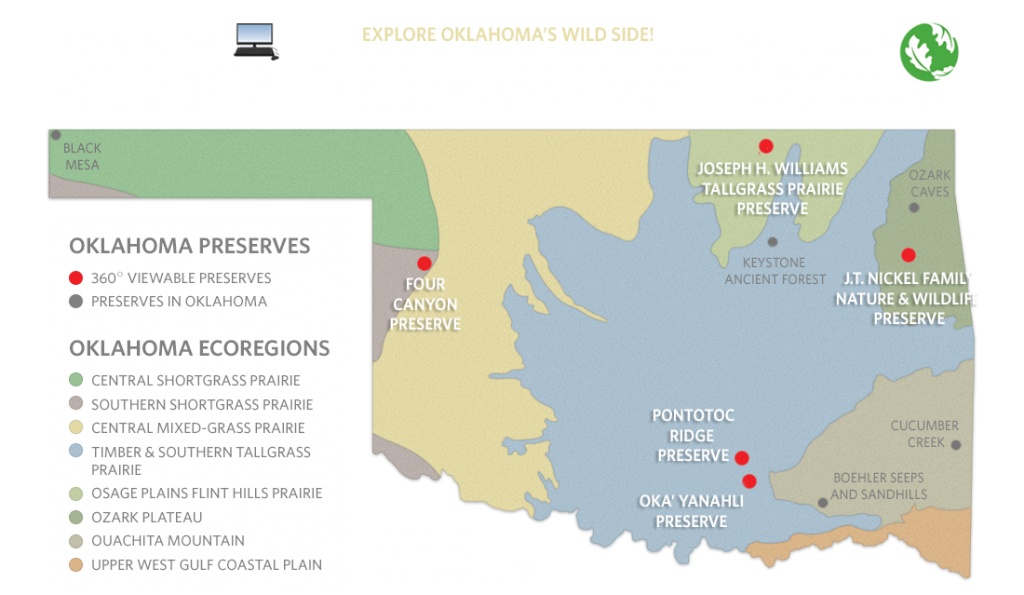
Nature Conservancy
New Mexico
The New Mexico Rocketeer Academy offers the opportunity to bring a field trip to your school with their “Portable Planetarium” program. Students will get the chance to view the night sky as it was at any point in the past, how it is today and what it will look like in the future with the digital planetarium. Rocketeer Academy educators that accompany the program will inform students of the images they see to bring a better understanding of space and what you can see of it from Earth.
The New Mexico Museum of Natural History and Science offers a “Science at Home” program to get students involved in science-related activities and learning. While the museum is temporarily closed, they have a collection of digital resources to aid educators and parents with printable activities, worksheets and coloring pages, an online rock identification program called “Mineral Mondays,” an outdoor scavenger hunt in their walk-through exhibit and their “Invite an Educator” program that allows you to bring in a museum educator into a virtual classroom. They also offer virtual field trips that explore and explain the landscape of the Petroglyph National Monument and the Sandia Mountains while learning ecosystems and volcanic flows with follow up activities.
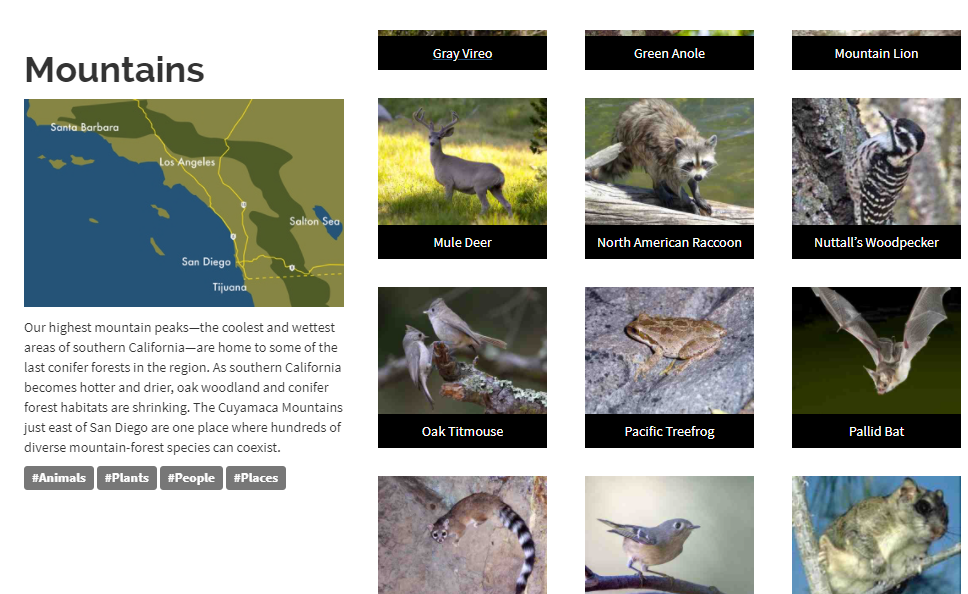
New Mexico Museum of Natural History and Science
Arizona
The Arizona Science Center is supporting students, educators and parents by providing lesson plans with interactive videos, activities, demonstrations and articles. Their virtual field trips aim to engage students of all grade levels while providing demonstrations and hands-on learning with STEM activities. They offer two virtual field trip packages with customizable add-ons, that will engage, inspire and educate students. Their first program offers an introduction video with an activity in the gallery, materials list, resource guide, a live workshop with an Arizona Science Center instructor and an extension video with an additional activity. Their second program offers the introduction video and activity in the gallery, a class kit of materials, a how-to guide with a PD video for teachers, a video guide of activity, an extension video and an additional activity. There is an opportunity to add on to your package along with additional available themes. The programs offer potential financial aid for Title 1 groups.
The Odysea Aquarium offers prerecorded videos, activities and live broadcasts for K-12 classes. Their virtual field trips offer a variety of wildlife modules of your choosing and come with a video and Arizona Science Standard activities appropriate for every grade level to experience before and/or after your live session with an aquarium educator. There is opportunity through application for Title 1 schools to receive a free virtual field trip.

